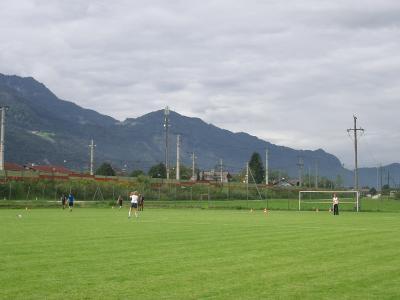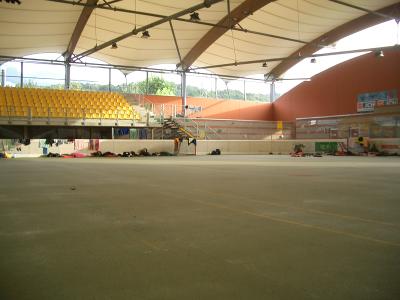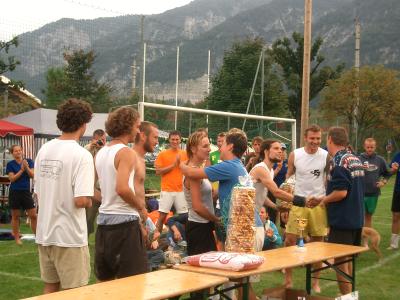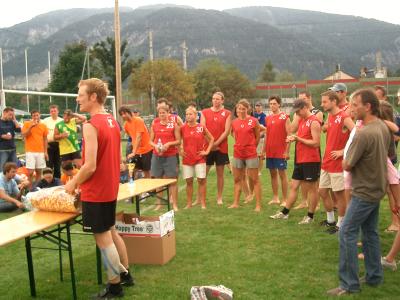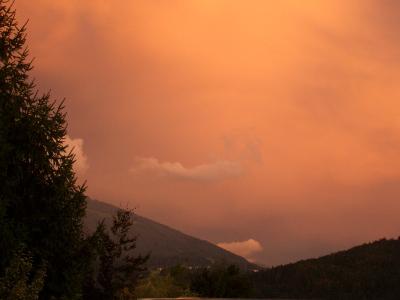Thursday, September 29, 2005
Physicists ruling the world!!!
Posted by
mick
at
10:16 am
![]()
Wednesday, September 28, 2005
Tuesday, September 27, 2005
Fun things to do on a Sunday when there is no frisbee training
This weekend I went hiking with one of my flatmates (Karol) and some of her mates. It was very cool, some spectacular scenery and a lot of laughter. Here are the pics:

The crew: Gerard, Karol (being distracted by a mountain biker hurtling down the hill while I took the photo), Martina, and Dani. I should point our that they are all doctors...

The crew without Martina and with me doing the stupid bunny ears thing to my flatmate Karol. I can't remember why I thought this was a good idea. It was in retaliation for something, I swear, I wasn't just being a smartarse.

What Innsbruck looks like from above.

What Innsbruck looks like from above at a slightly different angle.
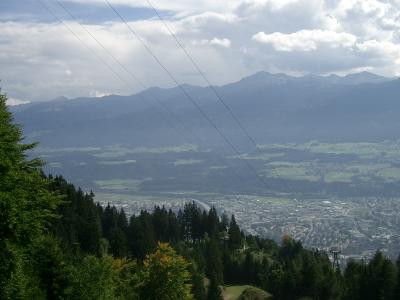
Cable cars are cool. Don't see them so often in Ozneyland. You might be able to make out the Inn, the river running through Innsbruck in this pic, I think that's what I was trying to take a photo of.
Posted by
mick
at
11:09 am
![]()
Friday, September 23, 2005
Damn damn damn
Posted by
mick
at
1:43 pm
![]()
"Loud doesn't mean right"
"Loud doesn't mean right"
Posted by
mick
at
11:37 am
![]()
Thursday, September 22, 2005
We still have a long way to go.
Posted by
mick
at
4:18 pm
![]()
Wednesday, September 21, 2005
And in more good news from Iraq...
Posted by
mick
at
5:52 pm
![]()
What does a frisbee tournament look like?
Warming up on the first morning:
The party:
Where we all slept:
The team that came 2nd and played savage (no reserves!) all weekend:
The winners:
Posted by
mick
at
5:08 pm
![]()
Thanks Georgie
"it was hard only 50 years ago to believe we would abort 100,000 babies a year,
contemplate men marrying men, killing the sick, experimenting on human
embryos.",
Posted by
mick
at
4:25 pm
![]()
Tuesday, September 20, 2005
Spirit prize
What should mean more to an ultimate player, winning the spirit prize or the
tournament?
Posted by
mick
at
3:04 pm
![]()
Monday, September 19, 2005
Totally priceless
Courtesy of Antony Loewenstein's blog. Geez I hope this makes it into a newspaper... Brendan Nelson's media people must be freaking out.
Posted by
mick
at
1:10 pm
![]()
A weekend disconnected
Posted by
mick
at
11:27 am
![]()
Friday, September 16, 2005
The Latham debacle
- A sudden, disastrous collapse, downfall, or defeat; a rout.
- A total, often ludicrous failure.
- The breaking up of ice in a river.
- A violent flood.
Well, we can kinda discount the last two, though a violent flood is a good description of the abuse and ramblings that have poured out of his pen and mouth over the last few days. Mark Latham's fall from grace has been hard, and ludicrous. It seems that he had real problems connecting to the realities of his own shortcomings.
It seems that Latham had a great vision for Australia. He had a vision of an egalitarian society that was strong and independent. Unfortunately, his vision was obscured by a hatred of the forces that he saw as being impediments to a better society.
It seems that his own hatred led to some of Labor's policy disasters in the leadup to last year's election. This is especially the case with Labor's divisive school's policy and the Iraq "troops home by Christmas" policy.
In today's Weekend Oz, Paul Kelly paints Latham as a character who increasingly sought to lash out at those around him throughout his tenure in the Labor leadership. The people Latham criticizes seem to be exactly those that he should have been listening to. Beazley, Rudd, Whitlam, Keating,... the list is a who's who of intelligent policy thinkers and strategists in the Labor party. It seems that Latham was himself a divisive character in the party, unable to work within a team, who believed that the only way forward was his.
I guess it was lucky for the ALP that he didn't win last year. Well, at least that's the line being spun by the Murdoch press. I'm not so sure I believe that. If Latham was so dangerous and divisive after an election win, then I'm sure we would have been given the boot by caucus. Anyway, this argument is purely academic, it's about events that never happened (in fact, that didn't really even come close to happening).
What I think should be speculated on a bit more, is whether there really was any divisive behaviour among the federal ALP leadership, and whether there still is? As Julia Gillard has pointed out, some of this should be looked into. Labor needs a united team to take on Howard, they need to get over their own ambitions and beliefs and take the fight to Howard.
Posted by
mick
at
4:21 pm
![]()
Tuesday, September 13, 2005
Links
Posted by
mick
at
3:03 pm
![]()
R-E-S-P-E-C-T
Find out what it means to me.
Natasha is definitely keeping it real.
Posted by
mick
at
10:05 am
![]()
Wednesday, September 07, 2005
Crazy conspiracy theories...
On of my mates (and scientific colleagues), "The Quantum Pontiff", recently posted an article talking about the fact that quantum information science is largely funded by 3/4 letter defense agencies that are extremely interested in Shor's Factoring algorithm. Shor's factoring algorithm can only be performed on a quantum computer that can factor large numbers in polynomial time (this is computer-speak for "damned fast"). Factoring large numbers quickly is important because if you could do it you could probably hack most available public key cryptosystems, that is most of the cryptosystems used on the net at the moment. Anyway, in this article "The Quantum Pontiff" discussed what might happen when we actually do build a quantum computer (which, incidentally is probably many years and many millions of dollars away). Who will control it? What will it be used for? These are good questions to ask and as a community, quantum information scientists need to have this discussion.
On a lighter (or not) note, some of my old workmates and I used to have a bit of fun wondering what you would do if you had discovered an efficient CLASSICAL factoring algorithm? That is, an algorithm that can be performed using the computers that we have right now.
Well, we used to debate about this a bit. I notice actually that David Poulin (another old friend and workmate) has raised this question in the comments on the Pontiff's page. We used to talk a lot about whether you should put it up on the net, tell the government, defense agencies etc... Most of the talk actually centered around two main issues:
- The impact of such a discovery on the world's economy
- Keeping yourself and the information safe
Like I said, this debate was normally just a bored group of physicists throwing around some big ideas for a bit of a laugh.
Ok, time for a random paragraph to another not quite so related (but soon will be) topic: Regular readers will know that I'm pretty into politics. I spend a lot of time reading plogs (politics blogs) and this blog is sometimes pretty much just about politics. Often the physics part of my brain is quite divorced from the politics part of my brain. I don't know why this is, probably has something to do with taking physics and politics courses at the same time back in school. I kinda had to get good at switching my brain from the Schroedinger equation to the class struggle in short periods of time in order to pass exams.
Anyway for some reason a few weeks ago I started to use my politics brain to think about the whole "efficient classical factoring algorithm" question. Here is what I came up with:
Imagine you are person who has just discovered, or is on the verge of discovering an efficient classical algorithm for factoring, or something to hack public key cryptosystems.
Who are you? Well, to begin with it goes without saying you are a math nerd.
Who are you professionally?As most of the money in this sort of field comes from the 3/4 letter agencies you are probably either directly working for them or are getting some sort of funding from them. It's hard to find mathematicians/physicists or whoever working on cryptosystems that aren't somehow involved with the 3/4 letter agencies. Often people would prefer not to, but it's just a fact of life that it's these agencies that dole out the dough.
Do you give the agencies the information you have discovered? Almost definitely. You are probably legally (and debatably morally) obliged to give them the information before it goes public. So, you do your job, because in reality you are just some math nerd and decisions like this shouldn't be made my you because you aren't qualified to make this call on your own.
What happens next? Well, they (the agency) panic a bit. This is BIG NEWS. Big news can be dangerous. For instance, what happens if you have such an algorithm and you don't have a public key cryptosystem that is invulnerable? I'm sure the thought would go through someone's head "if we can find this, why can't someone else?". The world is full of smart math nerds, often results are proven independently and simultaneously by mathematicians all over the world. Surely any defense agency would begin to get pretty worried about how to control who has access to such an algorithm.
A good analogy would be nuclear proliferation. There is no power in having nuclear weapons if everyone else has them. All you have then is a seriously dangerous situation.
If you have the biggest stick, you want to make sure no-one else gets a stick as big as yours.
What do you do about it? Well, this is where my political head kicked in. Politics 101 tells you that if you don't want someone to see something, give them something else to look at. Is quantum computing that "something else"? In the mid 90s did someone get close to finding a way of breaking public key cryptosystems? Is the influx of money into quantum information science just a really clever way of diverting a bunch of really smart mathematicians, computer scientists and physicists away from something big?
I mean, it's pretty easy to see that quantum computing would absorb a lot of people for a long time. Everyone has always said that building a quantum computer would be really hard to do. There is a lot of interesting science to be done in the meantime, with a lot of potential for spin-offs which are also interesting. As far as basic science is concerned, quantum computing is a great way of advancing science. Maybe "they" realized that they could easily get people to work on quantum computing (because as far as science goes, it's interesting), but is it also a good way of distracting scientists from the "main game"?
By publicly announcing support for QC, and not really making any secret of the fact that you want it for Shor's algorithm are the 3/4 letter agencies really doing the scientific equivalent of pointing over someone's shoulder and yelling "hey, look at that!" ?
In politics it is always hard to hide information. It is always easy to make a lot of noise about something that isn't such a big deal...
Posted by
mick
at
10:48 am
![]()
Monday, September 05, 2005
More lazy blogging
By the way, can anyone tell me why sunsets are so amazing after thunderstorms? I'm guessing it has something to do with high humidities and subsequently larger amounts of refraction in the atmosphere. I can't quite put my finger on it... Something to do with the red light being refracted more than the blue... Okay, that is probably the answer, but if someone has something better (i.e. they have thought about it for longer than it took me to write this sentance) I'd like to hear it.
Posted by
mick
at
3:16 pm
![]()

